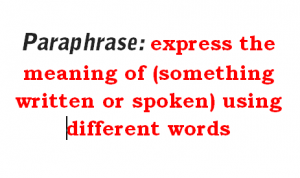 You’ve probably been told this a hundred times over, but it’s so important that it needs reiterating. Paraphrasing is essential to picking up the top marks and scoring the higher bands in your IELTS exam.
You’ve probably been told this a hundred times over, but it’s so important that it needs reiterating. Paraphrasing is essential to picking up the top marks and scoring the higher bands in your IELTS exam.
Put simply, paraphrasing is the art of saying the same thing in a different way. In order to do well in your IELTS speaking exam, you need to have mastered this skill and have plenty of variations up your sleeve.
Paraphrasing is vital for IELTS
Paraphrasing is vital to success in your IELTS examination for a number of reasons. First of all, it gives your examiner a way of seeing that you have understood the question or the task you have been given. In addition, paraphrasing gives you a valuable opportunity to show off language skills. After all, it’s no good simply repeating back the terms of the question: if that was all that was required to do well in IELTS, then a parrot could pass their speaking exam. Of course, to score a higher band, being a parrot is not enough, you need to show that you’re a creative human being with a sound knowledge of the English language.
Paraphrasing can also help to clear up misunderstandings due to ambiguous vocabulary, and gives your examiner an idea of how you understand the question and the perspective which you’re going to take. This, in turn, can be a key starting point for developing a clear, well-presented argument, which is also a fundamental part of the IELTS speaking exam.
Although paraphrasing is an excellent tool for demonstrating your knowledge, it can also be handy for covering up gaps and mind blanks. In your written examination, paraphrasing allows you to get your message across, even if words fail you. If you are desperately wracking your brains in a speaking exam for a particular word, you’re likely to find yourself stumbling and hesitating. Fluency is a big part of the oral component in the IELTS, so learning to paraphrase can help to avoid these hiccups, and keep you feeling confident and in control.
Paraphrasing is not easy
In order to paraphrase effectively, you need to have a strong base of vocabulary. It’s also really important that you feel at ease with your grammar, and can use complex constructions effectively to give you the greatest scope to paraphrase in an interesting and thoughtful way.
It’s not easy to develop skills in paraphrasing. It takes a lot of practice, so make sure you test yourself regularly, with a tutor or even with a friend or family member. Make sure your vocabulary is strong and try to develop a list of synonyms for common words from topics covered as part of the IELTS.
Practise paraphrasing to improve
However confident you are feeling about your IELTS exams, it pays to spend some time thinking about paraphrasing. Practise using other words and constructions in everyday conversations, or have a go at finding alternatives with friends. Every time you come up with a good phrase, write down the original and your paraphrased alternative – you’ll soon come up with a bank of ideas to help jog your memory.
In the end, paraphrasing should become second nature, putting you on the road to IELTS success.

Thanks for the peice of information about paraphrasing. I never thought of it. Pls help with more information that could help my band. I ve done this test thrice. Though my problem is actually in the listening. Am always very far from the tape. I need help please.
Regards
Juliana.